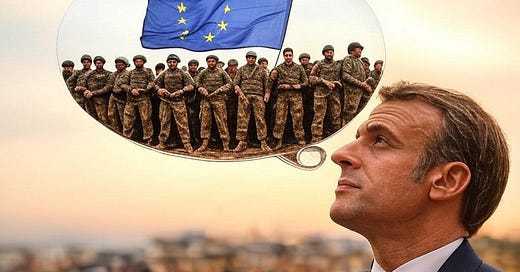A Pan-European Army Will Always Be a Fantasy
Europe’s fragmented sovereignty, bureaucratic inertia, and pathological aversion to defense spending would kill an EU army faster than any Russian could.
In light of Vice President JD Vance’s visit to the continent, nervous European leaders are calling for an EU style Grande Armée.
The Trump administration has been clear it intends to curtail military spending in Ukraine, and has repeated its 2016 demands that Europe pay up when it comes to NATO spending.
Europeans uneasy about continued reliance on American largesse to protect them from geopolitical foes have thus turned internally for their defense needs.
The idea of creating an army that would represent the whole of the Old World is nothing new. In 1952, several proto-EU members proposed the Treaty of Paris, a common defense agreement that would have merged the disparate armies of Benelux, France, Germany, and Italy.
The French parliament scuttled the treaty, rightly arguing any country that gave up its defense to a supranational organization would be insane. Since then, France and her leaders have ironically are leading calls to lessen reliance on NATO and the U.S. for defense, and instead form an EU army.
Greater Europe rebuffed Charles de Gaulle’s attempts at a continental army in the 60s while Emmanuel Macron’s pleas for European security autonomy have largely fallen on deaf ears.
But Europeans leader’s reliance on NATO is but one reason why an EU army is unlikely to materialize. The nature of the bloc itself is responsible for several critical chokepoints that make United European Defense Force unlikely.
First are fights over national sovereignty as a result of the European Union’s nature as a bloc of sovereign states.
France is still a sovereign country that exists independently of the EU, unlike, for example, Texas which exists solely as a state within the U.S.
Texans may pride themselves on their independent streak, but they are ultimately bound by the same constitutional and federal standards as the other 49 states.
Indeed, the federalized nature of the U.S. versus the interstate compact vision of the EU leads to some odd political conflicts between the myriad sovereign states, particularly when it comes to domestic industry.
Given that tariffs have been in the news recently, it should interest readers that there are not just tariffs between Europe and the U.S., but between Europe and itself.
In an article for The Financial Times, former European Central Bank president and Italian prime minister Mario Draghi noted, “The IMF estimates that Europe’s internal barriers are equivalent to a tariff of 45% for manufacturing and 110% for services,” adding that “trade across EU countries is less than half the level of trade across U.S. states.”
Europe’s sovereign states would never sacrifice their domestic industries for the benefit of a supranational bloc, especially when such policies would trigger domestic unrest.
Which leads to the next problem.
While Europeans claim to be unified under the bloc’s blue banner, few would be willing to die for their own country in this hypothetical army, let alone a quarrel in a faraway country between people of whom they know nothing.
A 2024 Gallup poll asked, “If there were a war involving your country, would you be willing to fight?” Among the least willing were major EU nations: Italy (78% unwilling), Germany (57%), and Spain (53%).
If Germans are reluctant to die for Germany, they are even less likely to sacrifice their lives for Hungarians hundreds of miles away. Especially considering the deep-seated tensions among EU nations that would hinder military cooperation.
And again we see an issue.
Europe is a morass of bureaucracy and regulations. It can be difficult to get anything through the labyrinth of national and EU governance. In many cases, policies passed at the supranational level require 100% approval from all 27 member states.
How could an army possibly function with such gridlock before it? Forget recruiting for the damn thing, how would Europe ever deploy it meaningfully?
EU Council President António Costa noted that a new security apparatus surrounding European defense would be necessary to counter increasing Russian aggression. But how does Costa propose that Europe counter Russian aggression with several members of the bloc who are either pro-Russian or Russia agnostic?
Drafting common defense policy without full member-state buy-in while demanding unanimity elsewhere would be a recipe for disaster. The EU doesn’t even have a unified fiscal policy. How could a defense policy be any closer?
Yet the most fundamental obstacle to an EU army is financial. Europeans have a noted aversion to spending on defense, preferring instead to dump buckets of money on lavish social programs.
Those entitlement programs don’t come cheap. EU nations spend on average 20% of their government expenditures on “social protection,” 8% on health, and 6% of general public services. Defense spending lands nearly dead last at about 1%.
Increasing spending on defense means money would have to be taken from somewhere else to fill the gap. Given that the lion’s share of the money is going to social services, that would logically be the place to cut.
But to do so would mean reducing those generous social benefits that Europeans like to flout about and is thus a nonstarter. It’s far easier to outsource defense to another party. Historically, to the United States.
There are a million reasons why a pan-European army remains a pipe dream and few arguments to why it would work. Europe’s fragmented sovereignty, bureaucratic inertia, and pathological aversion to defense spending would kill an EU army faster than any Russian could.
European leaders are scrambling for a Plan B as America pulls back her largesse, but they will find none. We will inevitably hear more talk of an EU army in the near future, and promises from European leaders about the dire need to unite. Yet the project will remain an exercise in wishful thinking, a Grande Armée only in Europe’s dreams.



